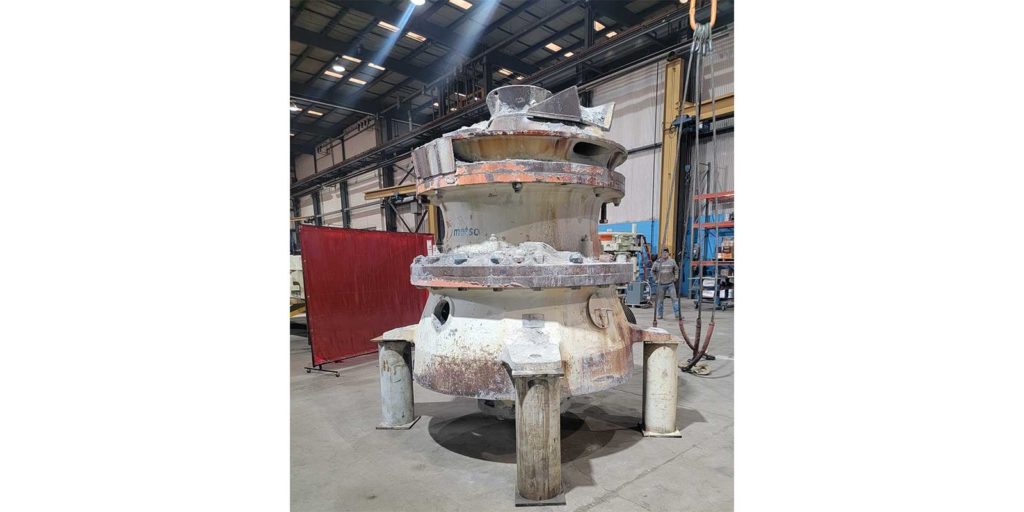Rock crushers are complex machines. There are many interconnected components that perform heavy tasks. If they’re maintained well with regular crusher maintenance services and parts, they can perform for years to come. When a rock crusher fails, it’s often due to one of three relatively simple principles:
- They’re being used in the wrong application.
- They haven’t been properly maintained.
- Manufacturers guidelines haven’t been followed.
Let’s take a look at each, so that you can avoid these mistakes and keep your rock crushing plant operating efficiently.
1. Rock Crushers Fail Because They’re Being Used In The Wrong Application
This one’s pretty straightforward: If a crusher is used in a way it shouldn’t be, it is more likely to fail.
There are two ways this happens.
The first is that rock crushers are intentionally used to crush material they aren’t equipped to process. Typically, this means attempting to crush material that’s too big at too large a rate of reduction – skipping a necessary secondary or tertiary crusher and going for throughput that is too small. If material is too large for a given crusher, then it will be harmful for the crusher to process. Running a machine in this way for any extended period of time will cause damage that will make failure more likely.
The second way this happens is that rock crushers are forced to process too much uncrushable material. This is particularly common for cone crushers. For example, if a quarry isn’t clean and yields too much clay, crusher performance can suffer, and failure may eventually result.
The bottom line is that crushers are less likely to fail if they crush what they’re designed for.
2. Rock Crushers Fail Because Maintenance Is Neglected
A second common reason that crushers fail is because they go too long without needed maintenance.
Rock crushers are complex machines – and just like any complex machine, they require regular care. Every crusher part requires maintenance in order to continue functioning optimally.
There are several ways that maintenance failure can lead to crusher failure:
Wear liners aren’t replaced in time. This can result in material wearing through the base metal of the rock crusher itself.
Buildup underneath the machine isn’t taken care of. Eventually, material may wear down the counterweight guard and then the machine itself will bring down a rock crusher.
Lubricants aren’t changed at the right intervals. This, too, will cause the machine to wear down and eventually fail. Proper lubricant system maintenance is essential.
Breathers aren’t cleaned often enough. If breathers get clogged, the rock crusher will pull in dust and degrade quickly.
There are many other components that can cause failure if maintenance is neglected; the key point is to perform maintenance at regular intervals according to specifications for every component. The right daily, weekly, bi-weekly, monthly, and annual maintenance routines, if followed properly, will greatly decrease the risk of unexpected failure.
3. Rock Crushers Fail Because Manufacturers’ Recommendations Aren’t Followed
Here’s the truth: The vast majority of rock crusher failures can be classified as negligence of manufacturer recommendations.
Most of the damage in our industry is primarily self-inflicted.
There are many ways that this plays out. For instance, failure might happen due to something as simple as not having the lubrication system set up correctly. Some operations might not move oil coolers far enough away from dust, leading to damaging oil temperatures. Some may not use the correct feed size.
Sometimes, the failure to adhere to manufacturers’ recommendations is simply the result of trying to cut corners. Installation crews may be incentivized to do quick work (especially if they aren’t the ones who will be operating the equipment). A good setup is crucial.
Other times, misalignment with manufacturers’ recommendations happens when older machines are replaced with newer machines. Operations aren’t changed to meet the new machines’ requirements, and damages result. This is understandable (it’s hard to change something when you’ve done it another way for 20 years), but it’s also costly.
New machines:
Incorporate different technology. A lot of new crushing equipment includes vibration monitors that are place on different areas of the rock crusher to give alerts during operation. If they aren’t configured correctly, operators won’t be notified when adjustments are needed.
At any crushing plant, it’s important to gather the information you can about your machines and their requirements. This means reading and adhering to all manufacturing manuals.
If you stick to using and caring for your machines according to requirements, they’ll be far less likely to fail.
Want More Guidance In Avoiding Rock Crusher Failure?
We hope this information has been helpful as you consider how to optimize your rock crusher’s lifespan and avoid costly failures.
If you’d like more insight into rock crushing maintenance, let’s talk. At Mellott, we have experience in equipping and servicing a broad range of rock crushing needs. We’re experts at navigating the different components of rock crusher part selection, setup, and maintenance.
If you’re looking for guidance in keeping your rock crushing plant operating at maximum efficiency – or want help in designing and implementing a plant according to manufacturer guidelines – get in touch with us today online or at 855.554.1606.

